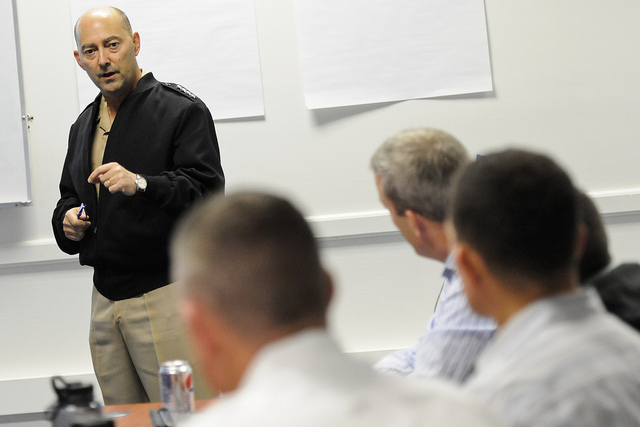
Retired Navy Admiral James Stavridis served as NATO's top military commander and now serves as the dean of the Fletcher School of Law and Diplomacy at Tufts University. (Courtesy of U.S. Naval War College).
Hillary Clinton’s vice presidential search has created some buzz in the Boston area, where a university dean was being vetted for the democratic ticket. With Clinton’s vice presidential pick imminent Friday or Saturday, Tufts dean Admiral James Stavridis was on the presumptive democratic presidential nominee’s shortlist.
Before arriving on the Medford campus, the retired Navy admiral was Supreme Allied Commander of NATO. The grandson of Greek immigrants, Stavridis, 61, first entered the armed services during the Cold War.
“My high school cohort faced the Vietnam War and the draft and many of the people in the military, frankly, didn’t want to be there,” Stavridis told me shortly after he first came on at Tufts.
Since then, Stavridis says, the challenges America faces have changed dramatically.
“I don’t ascribe to this theory of the United States in decline," he said. "I think you’re seeing the rise of the rest. You see China, India, Brazil, along with Russia and other powerful states that are part of this global landscape. That brings new kinds of security challenges, including the rise of violent extremism.”
Stavridis says the extremist threat makes it a much more complicated world. Still, the admiral tends to look on the bright side.
"The good news is we don't have to worry about a nuclear war and an apocalyptic ending as we did in the Cold War. We don't face an implacable totalitarian regime as we did in the form of the Soviet Union. On the other hand, it's hard. You have to understand so many different cultures, languages, histories and ideas."
For the past three years, Stavridis has inspired young people to explore those ideas, serving as dean of Tufts University’s Fletcher School of Law and Diplomacy.
“Students at Fletcher clearly admire Admiral Stavridis for his leadership,” said Torrey Taussig, 27, a PhD candidate at the Fletcher School. Taussig is thrilled about the prospect of Stavridis being tapped as Clinton’s vice president.
“I think this would be a great pick for Secretary Clinton and the country would be fortunate to have him in this position," Taussig said. "He is an incredible forward thinker. He’s very strategic but he’s also a very thoughtful individual and he has a great command of history and the issues that he cares about.”
This week, Stavridis and I spoke again by phone and I asked him why he would want to leave his post to be vice president.
"I throughout my life have consistently been willing to serve," he said. "I’ve not pursued that job or any other job in government and I’m very, very happy at the Fletcher School.”
Even if Clinton doesn’t pick him, Stavridis says the qualities and temperament voters should look for in a vice president are the same they’d want in a commander in chief.
"I think you’d want someone who is balanced," he said. "Very important for the vice president is a lack of ego. You want someone who doesn’t have a personal agenda and seeks to serve the president and serve the nation.”
Earlier this week, Stavridis criticized Republican presidential nominee Donald Trump's foreign policy. At the Republican National Convention, Trump said NATO is obsolete and the U.S. shouldn't automatically defend its allies.
"I think it's an idea that even the youngest student at a university would immediately pull apart," Stavridis said, pointing out that Trump's view is a violation of a treaty and international law.
"Our strongest allies in the world are out European partners. They've stood with us in Iraq, Afghanistan, Libya and the Balkans. So for us to abrogate an agreement would be reprehensible."
Stavridis is a registered independent. He wasn't planning to be at the Democratic National Convention in Philadelphia next week, and he won't urge students to vote one way or another this November.
Choosing the next commander in chief, he says, is a personal decision.










